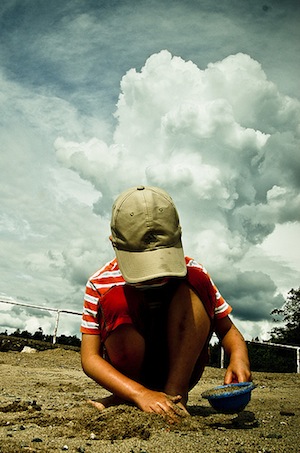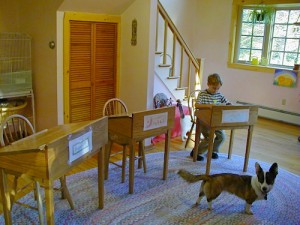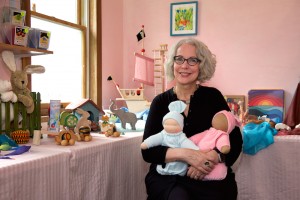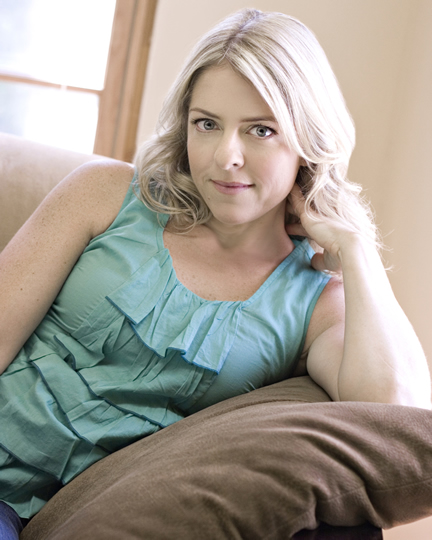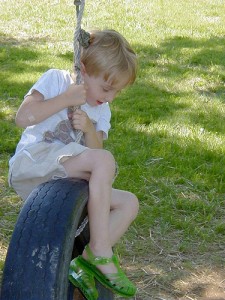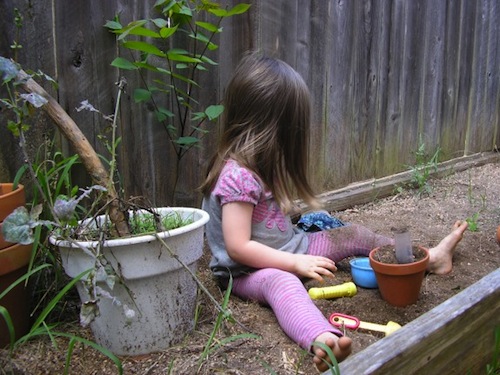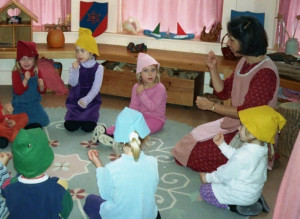I became a fan of Shannon Honeybloom as soon as I first laid eyes on her beautiful book, Making a Family Home. Not only was I thrilled with its beautiful photographs and ideas on how families of young children can create a more beautiful, nurturing and rhythmic home life, but I was also amazed to learn how much Shannon and I have in common!
Not only do Shannon and I share backgrounds as actors, but we also have both authored books, gone to NYU, lived in Brooklyn, and received an M.S. in Waldorf Early Childhood Education from Sunbridge College in Spring Valley, NY. What are the chances? Though we have never met in person, Shannon feels like a soul sister to me (albeit a younger sister!).
Over the course of the past year, we’ve enjoyed a series of lovely e-mail exchanges. I told Shannon how much I wish her book had been available while I was teaching Waldorf Parent/Child classes. I would have liked to put a copy in the hands of every parent in my class. So naturally I was thrilled when Shannon offered a copy Making a Family Home as a giveaway to readers of Moon Child. I also thought it would be a great opportunity to introduce you to Shannon and get to know her a little better.
SARAH: You know that I am a big fan of your book Making a Family Home. Can you tell us what led you to write it?
SHANNON: When my first child was born, it was a really crazy time for me. As any new parent knows, one’s world is instantly transformed when baby arrives! I was thrilled to be a mother, but I really had no idea about what it meant to be a mother and to raise children. I started to think about motherhood, caring for a family, and making a family home. I realized that a happy, healthy home is so important for children, and gives them a strong foundation for their future success and happiness.
Those thoughts and concerns, that early confusion, and also exploring early childhood education and homemaking in a graduate program setting, all provided the spark for Making a Family Home.
SARAH: Can you tell us a little bit about your family and the rhythm of your days?
SHANNON: I have three children–two sons, ages 7 and 9, and a 4-year-old daughter. They are all in school now, so that provides the big daily rhythm for us, and we tuck in other routines around it.
We wake in the mornings, and to make things easy and smooth, we have already picked out their clothes the night before. After breakfast (something like pancakes, or on busier days, cereal with toast and fruit) we head off for school.
After school we try to keep extra activities to a minimum and really allow the children to play. Childhood is fleeting and the most important thing children can do is play freely. Of course, we do have some scheduled activities. My older son loves to play golf, so we have a golf lesson, or a game now and then; and we have swimming lessons in the warmer months.
After dinner, the children get ready for bed. Our bedtime routine is well established–we light a candle, read a book, say a verse, sing a lullaby, and lights out. When days are busy and crazy, I treasure that quiet moment in the evening with my children.
SARAH: What effect do you think a child’s environment has on her behavior and sense of well-being?
SHANNON: Everything affects all of us, but children’s senses are especially sensitive to their environment. Noise, temperature, color, texture, light, and smell all affect us in some way. Creating a nurturing space for children is about paying attention to how the senses are affected in each moment. If the television is blaring, if the colors and shapes are hard and garish, if the temperature is frigid, then all those things make us feel and act in certain ways.
If, on the other hand, a room is comfortable, relaxed, and quiet; if the light is gentle, the colors harmonious, and the furniture soft; then that affects us in a certain way, too. We can bring consciousness to our homemaking in order to create a healthy environment for our children.
If we feel comfortable in our bodies, if our senses are nourished, if we are filled with a sense of well-being, then we are free to pursue our life’s work, whatever that may be!
SARAH: I’ve met many parents who express a desire to transform their home from a place of disorganized chaos to a more nurturing, rhythmic and peaceful environment. The task can seem daunting and overwhelming, and parents often don’t know where to begin. Are there three simple actions you can recommend to take as first steps?
- Declutter/Simplify. Release stuff from your life and from your schedule, too. Making a nurturing home is ultimately about nurturing the relationships in the home, it’s not about all the stuff you can buy. Focus on the people in the home and not on the stuff.
- Simplifying life goes hand-in-hand with de-cluttering. Try to simplify things just a little bit. It’s hard these days–there is so much to do! Try and cut back a little, and instead of always being on the run; stop, slow down and spend time with the people you love.
- Unplug. Resisting the constant temptation of email, the computer, and cell phone is definitely a challenge for me, but the constant chatter of all these machines is not helpful if one is trying to live in the moment. I try to find time to really unplug from these gadgets and simply be in the moment with the people I love. Being with someone–a child or an adult–and showing interest in him or her, is a way to demonstrate your love. But if your interest and attention are always being pulled away by electronic gadgetry, then that is a loss.
- Love. Which brings me to my last tip, love. Making a nurturing home for your family is one way to express your love for them.
SARAH: What are you doing with your life right now? (Besides the important job of parenting!) Are you finding time to pursue acting?
SHANNON: I try to find time to write and act. I have some really exciting acting projects right now; one is an independent film that is shooting in July. What I do artistically nourishes me, and in turn, helps me to nourish my family.
SARAH: How do you juggle your various activities and keep balance in your life?
SHANNON: It’s not always easy, but I try. I think just being aware of the importance of balance is a great start. When things get crazy and hectic, I try to step back and slow down. Right now I am enjoying yoga and that helps me to breathe and find a moment of peace amid life’s chaos.
SARAH: Is there anything new you’re working on? What is the best way for readers to keep abreast of your work?
SHANNON: I have some writing projects that I am working on in addition to the film project that I mentioned earlier.
SARAH: Thank you so much, Shannon, for sharing your time with us and for the wonderful gift of creating Making a Family Home!

Win a Free Copy of Making a Family Home!
For a multiple chances to win, please spread the word about this giveaway! Blog about it, Tweet about it, or share it on Facebook. Leave additional comments noting each action taken.
The Giveaway is open to all, but a winner outside of the continental U.S will be responsible for shipping charges.
Lots of luck!

